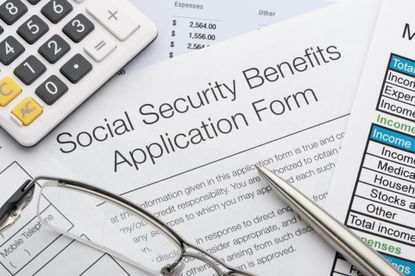What's My Social Security Full Retirement Age?
The year you were born determines when you become eligible for your Social Security full retirement age benefit. Use our calculator to determine your full retirement age.

Waiting until your Social Security full retirement age (FRA) to start taking benefits can have a big financial payoff. Any delay in taking your Social Security benefits will increase your monthly check for the rest of your life. Your check will get a bump up for every month you don't collect benefits up to the age of 70.
Social Security full retirement age explained
If you wait until your full retirement age, you are eligible to collect 100% of your Social Security retirement benefit. Initially, when the Social Security Act was signed into law in 1935, that age was 65. However, a law passed in 1983 gradually increased the retirement age to 67. You do have the option to take your benefits early, which will reduce your checks, or delay until past your full retirement age, netting you a bigger benefit.
Find Your Own Full Retirement Age with Our Easy Calculator

Sign up for Kiplinger’s Free E-Newsletters
Profit and prosper with the best of expert advice on investing, taxes, retirement, personal finance and more - straight to your e-mail.
Profit and prosper with the best of expert advice - straight to your e-mail.
Claiming Social Security early reduces benefits
You can claim your Social Security retirement benefits as early as 62 but you will receive a smaller amount if you do that. How much your benefits will be reduced depends on your age when you claim Social Security. For example, let’s say you are eligible for 100% of your benefits at age 67, which is the full retirement age for anyone born in or after 1960:
- If you claim Social Security early at age 62, your benefit will be reduced by 30%
- If you claim early at age 63, your benefit will be reduced by 25%
- If you claim early at age 64, your benefit will be reduced by 20%
- If you claim early at age 65, your benefit will be reduced by 13.3%
- If you claim early at age 66, your benefit will be reduced by 6.7%
Under this example, if you were eligible for $1,000 a month at your full retirement age of 67 then the benefit would be reduced to $700 a month if you claimed at 62; $750 if you claimed at 63; and so on, according to the Social Security Administration. The reduction is calculated each month, not on a yearly basis, so every month you wait after age 62 will mean a slightly bigger Social Security check.
Claiming Social Security after your full retirement age increases benefits
You can also wait as late as age 70 to start collecting Social Security benefits. Doing so boosts your retirement benefits. There’s no incentive to wait after age 70 to claim Social Security.
Here’s how your benefit will increase if you wait to claim Social Security:
- If you delay claiming until age 68, your benefit will increase by 8%
- If you delay claiming until age 69, your benefit will increase by 16%
- If you delay claiming Social Security until age 70, your benefit will increase by 24%
Using this example, if you were eligible for a Social Security retirement benefit of $1,000 per month at your full retirement age of 67, the benefit would increase to $1,080 if you delay claiming until age 68; $1,160 if you delay to age 69; and $1,240 if you delay to age 70.
The age at which you start Social Security benefits may affect your spouse's benefits. You may have more flexibility if you are married since one spouse can start taking benefits while the other waits. So, if you are married, be sure to factor in your spouse's FRA and when they plan to start benefits.
Once again, the delayed retirement credits accrue monthly, not annually, so every month you wait beyond age 67 will net you a slightly bigger monthly check from Social Security.
Read More
- Social Security Basics: 12 Things You Must Know About Claiming and Maximizing Your Social Security Benefits
- When to Apply for Social Security: Your Age Is Key
- No, Your Social Security Benefits Aren't Going Away
- Three Social Security Changes in 2024 to Know
- How to Estimate Your Social Security Benefits

To continue reading this article
please register for free
This is different from signing in to your print subscription
Why am I seeing this? Find out more here
Get Kiplinger Today newsletter — free
Profit and prosper with the best of Kiplinger's advice on investing, taxes, retirement, personal finance and much more. Delivered daily. Enter your email in the box and click Sign Me Up.
Jackie Stewart is the senior retirement editor for Kiplinger.com and the senior editor for Kiplinger's Retirement Report.
- Ellen KennedyPersonal Finance Editor, Kiplinger.com
-
 Four Steps to Secure Your Retirement Income
Four Steps to Secure Your Retirement IncomeInstead of relying on selling stock to fund your retirement, consider these actions to safeguard your retirement income.
By Cosmo P. DeStefano Published
-
 Best Closed-End Funds (CEFs) to Buy Now
Best Closed-End Funds (CEFs) to Buy NowThe best closed-end funds will significantly boost your portfolio income and allow you to buy their underlying stocks and bonds at a discount.
By Charles Lewis Sizemore, CFA Published
-
 For a Concentrated Stock Position, Ask Your Adviser This
For a Concentrated Stock Position, Ask Your Adviser ThisThere can be advantages to having a lot of stock in one company, but ‘de-risking’ can help avoid some significant disadvantages.
By Robert Gorman Published
-
 Taxes on Retirees: A State by State Guide
Taxes on Retirees: A State by State GuideRetirement Taxes See how each state treats retirees when it comes to income, sales, property and other taxes.
By Katelyn Washington Last updated
-
 Give Cash Now, Cut Your Estate Tax Later
Give Cash Now, Cut Your Estate Tax Latertaxes During this season of giving, take advantage of the annual gift tax exclusion before the year ends.
By Rocky Mengle Last updated
-
 Calculate Your Required Minimum Distribution From IRAs
Calculate Your Required Minimum Distribution From IRAsrequired minimum distributions (RMDs) The IRS updated the uniform lifetime table, which is used to determine your mandatory withdrawals, this year. This tool can calculate your RMDs from a traditional IRA.
By Jackie Stewart Published
-
 Retirement Calculator: How Much Do I Need to Retire?
Retirement Calculator: How Much Do I Need to Retire?retirement planning Our Retirement Calculator estimates the future value of your retirement savings and determines how much more you need to save each month to reach your retirement goal.
By Ellen Kennedy Last updated
-
 10 Timeless Investing Principles
10 Timeless Investing Principlesretirement Investors and retirees looking for reassurance during challenging stock market times can take heart in these time-tested investing principles.
By Jonathan I. Shenkman, AIF® Published
-
 The 6 Best Vanguard Index Funds for 2019 and Beyond
The 6 Best Vanguard Index Funds for 2019 and BeyondIndex Funds Investing icon Warren Buffett advises investors to stash 90% of their money in a Standard & Poor’s 500-stock index fund and keep the rest in short-term government bonds.
By Steven Goldberg Published
-
 Vanguard Index Funds’ Fees Are Going Even Lower
Vanguard Index Funds’ Fees Are Going Even LowerIndex Funds Owners of Vanguard index funds’ Investor class shares to be moved into Admiral class
By Nellie S. Huang Published